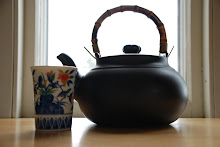
I was on foot doing errands. Armed with a compact umbrella tucked away in my backpack, I scurried about town looking up occasionally at the gray sky which was fuzzily etched with giant thumbprints. The sun hadn't set yet and there were streaks of crimson lashed across the sky. Pencil-thin raindrops fell, finally relieving the suspense hanging in the air. I was glad to be in the rain, to feel the bracing drops grazing my forehead. I snapped open the umbrella and entered a little nook sheltered by this awning -patterned with cats and dogs crazily falling from the sky. I was on an island, magically dry, surrounded by the thick sheets that were now coming down fast.
I took a detour, one that would take me by a woodsy area on campus. A chain-link fence enclosed it, protecting this arboreal nest in the midst of university life. There was an unobtrusive path that winds through the woods but because of the rain, I decided to stay alongside the fence. I looked at the tops of the thick-trunked trees -a riot of autumnal colors- standing like sentinels guarding the enclosure. A carpet of fallen leaves on the pavement, a saltiness in the air wafting in from the lake, they piqued my senses reminding me of my first real autumn years ago. I remembered seeing fall come to the Ozarks, to a little town whose main road snaked over hill after hill until it reached our little apartment on the grounds of the large Chest Hospital where my dad worked. The grounds were a large expanse of grassy knolls, dotted with tall trees. We would hurtle down these little hills, my sister, brother, and I, racing each other and kicking up the fallen leaves. I marvelled at their colors, at the dizzying variety. We carried armfuls of the leaves, bringing them into these little grottoes that curiously carved themselves into the grounds of the hospital. We were early American pioneers, intrepid and resourceful, and the leaves were our provisions to be stored away for the upcoming winter.
Presently, I arrived home, shoes seeping wet and squishily uncomfortable. I brought in the smell of rain and as the cats came to greet me, they flared their noses vigorously as they sniffed the air. Only momentarily distracted from the all-important matter of food, they noisily led me to their empty bowls. A flurry of expectant meows and flailing paws ensued as I pulled out their bag of food. Then all was quiet except for the chomping of pellets.
I turned on the tea kettle and waited for it to boil. It seemed fitting to brew tea now, during these first days of fall. The tea leaves, harvested in the spring, were ripely green and plump with the season. They show no inkling of the seasons to come, of the settling in of senescence.
I scooped them - the aptly named Ensi Needles, a Chinese green- into the glass infuser and watched the needle-shaped leaves elongate to their full extent. I sipped the rich honeyed liquor and breathed in draughts of the lake that came in through my kitchen window.














